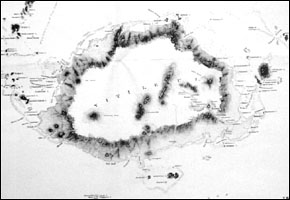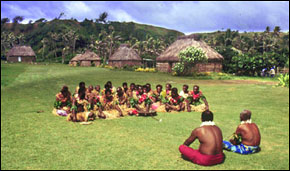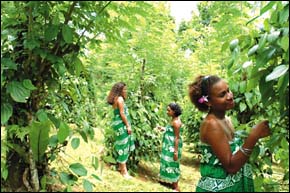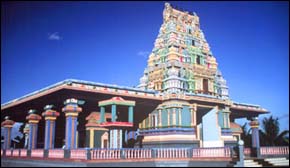 HISTORY HISTORY |
From Cannibalism to Capitalism
 VITIAN
CULTURE VITIAN
CULTURE |
Fiji, the name given to the island group after
the arrival of the Christian missionaries and
European colonization, comes from the Tongan name
for the islands. Before the arrival of Europeans,
the inhabitants called their home Viti.

According to Fijian legend, the great chief Lutunasobasoba
led his people across the seas to the new land
of Fiji. Most authorities agree that people came
into the Pacific from South East Asia via Indonesia
. Here the Melanesian and the Polynesians mixed
to create a highly developed society long before
the arrival of the Europeans.
The Lapita people first settled the Fiji Islands
about 1500 BC. Linguistic suggest that they came
from Vanuatu or the eastern Solomons. These people
coastal dwellers relied on fishing, are thought
to have lived in relative peace. However from about
2500 years ago, a shift towards agriculture occurred,
along with expansion of population. This led to
an increase in inter rival feuding. Cannibalism
become common and in times of war villages moved
to fortified sites.
About 1000 years ago Tongans and Samoans invaded
from the east, prompting larger scale, more organized
wars. More Tongans invaded in the 18th century and
villagers again sort refuge in forted sites. While
there were also extended periods of peace, Viti
was undergoing intense social upheaval at the time
of first European settlement.
 FAMILY
GROUPS FAMILY
GROUPS |
Vitian society centred on 'mataqali' (extended family
groups), headed by a turaga- ni- koro (hereditary
village chief), who was usually male. The Chiefs
everyday role was to chat and solve problems while
the men in the village worked in the fields and
the women fished, cooked and made crafts. Ownership
was collective but the Chiefs controlled the allocation
of land and labour. A Chief's immerse power over
the community was reinforced by the belief that
he or she was tabu (sacred) and their mana (spiritual
power) was derived from a special relationship with
an ancestral god.

Chiefs were polygamous and intermarriages led to
complex interrelationships between mataqali. Villages
were also grouped under a paramount chief. Normally,
the position of chief passed through a generation
of half-brothers before passing to their sons, but
the village elders often hotly debated the appointment.
Rivalry and power struggles were common, resulting
in fighting and occasionally all-out war between
close neighbours, who were invariably related.
To further complicate the matters, a chiefly woman's
son could claim ownership over property of her brothers
from other villages. This was known as the vasu
system.
|
 TRADE TRADE |
No Vitian community was completely self-sufficient.
Some villagers produced specialised products that
were traded through networks operating throughout
the islands. Trade even extended to Tonga and Samoa.
Viti was, however never, politically unified and
there were local variation in culture.
Traders and Beachcombers
Tongans had long been trading with the Lau group
and other more distant Fiji Islands. Colourful
Kula bird feathers, which were highly valued for
their use in ceremonial dress, masi (printed bark
cloth) and weapons were traded. From the early
19th century the European traders also began to
visit Fiji waters. Whalers and sandalwood and
beach-de-mer (sea cucumber) traders had a significant
and disruptive impact on the local population,
introducing arms and foreign capitalist values.
Some Chiefs even sold land for guns to use in
warfare.
Sandalwood Trade
The fragrant sandalwood timber was highly valued
in Asia. Initially Tongans obtained sandalwood
from the Fijian chiefs of Bua Bay on Vanua Levu,
and sold it on to the Europeans. However, when
Oliver Slater, a survivor of the shipwrecked Argo,
discovered the location of the supply, he spread
the news of its whereabouts. Europeans began to
trade directly with the Fijians in 1805.

Beche-de-mer Trade
Asia was also a lucrative market for beche-de-mer,
where people consider it for a delicacy. As with
sandalwood, this trade was short-lived due to
overexploitation, only lasting to 1830 to 1835
and 1844 to 1850.
 EUROPEAN
SETTLEMET EUROPEAN
SETTLEMET |
During the 17th and 18th centuries, Europeans crossed
the southwest Pacific searching for terra Australias
incognita, or the 'unknown southern land'. The
European discoveries of the Fiji group were accidental.
The first of these discoveries was made in 1643
by the Dutch explorer, Abel Tasman and English
navigators, including Captain James Cook who sailed
through in 1774, and made further explorations
in the 18th century.
Major credits for the discovery and recording of
the islands went to Captain William Bligh who sailed,
through Fiji after the mutiny on the Bounty in 1789.
The first Europeans to land and live among the Fijians
were shipwrecked sailors and runaway convicts from
the Australian penal settlements. Sandalwood traders
and missionaries came by the 19th century.
Cannibalism practised in Fiji at the time quickly
disappeared as the missionaries gained influence.
When Ratu Seru Cakobau accepted Christianity in
1854, the rest of the country soon followed and
tribal warfare came to an end. After Fiji was ceded
to Great Britain in 1874, epidemics nearly wiped
out the population and it seemed as if the natives
were doomed. But the colonial government took the
Fiji's side.
By the 19th century, local skirmishes were verging
on civil wars. This led the Europeans to believe
that the islands were in constant state of war.
Land sales were forbidden, health campaigns implemented
and the population picked up again. Theirs was not,
of course, the culture of the heal, then "golden
age" but one modified by the new religion and
increasingly the new economic order.
 INDIAN
SETTLEMENT INDIAN
SETTLEMENT |
From 1879 to 1916 Indians came to work on the
sugar plantations. After the indentured system
was abolished, many stayed on as independent farmers
or businessmen. Today they comprise about 43.6
per cent of the population.

 RECENT
EVENTS RECENT
EVENTS |
In 1987 Rabuka apologised to the Queen Elizabeth
for the military coups, which ended her position
as head of State. He presented her with a tabua
as a gesture of atonement. The following month
Fiji was readmitted to the commonwealth.
In 1998 the Fiji dollar was devalued. Fiji had been
badly affected by the Asian economic crisis, with
tourist numbers from South Korea and Japan plunging.
The prolonged drought the worst in Fiji's recorded
history, had had a devastating effect on the sugar-cane
industry. Uncertainty continued as the Fiji-Indian
farmers land leases began to expire. The outflow
of professional and skilled workers continued, the
vast majority being Fiji Indians. In an apparent
about face, Rabuka recommended that all of Fiji's
citizens, regardless of race, religion or country
of origin, be called 'Fijian', to promote unity
and oneness into the new millennium.
Under the new constitution voting became compulsory
and a record number of political parties joined
the competition for seats, dividing voters traditional
preferences. Female candidates held a joint campaign
rally in Suva and called for women voters to vote
for female candidates, rather than along the party
lines.
In May 1999 elections, Fijian voters rejected Rabuka
and the SVT. The FLP run by Mahendra Chaudhry, won
the majority seats and formed a coalition with the
FAP. The NFP, led by former opposition leader Jai
Ram Reddy, had expected to join the SVT in a coalition
government, but fared poorly in the election.
Chaudhry a Fiji Indian, became Fiji's prime minister.
Many feared that another coup would be staged. There
was an organised demonstration in weeks that followed,
and in August a series of explosions in Suva.
Rabuka has since become chairman of the Great
Council of Chiefs. It is widely believed he will
make a come back for the new elections, using
his new position to reunite the Fijian political
movement.
Prior to the elections Rabuka had invited India
to restore diplomatic relations with Fiji. An
Indian high commissioner arrived in Fiji after
the elections, following a nine-year diplomatic
standoff between the countries.
|

